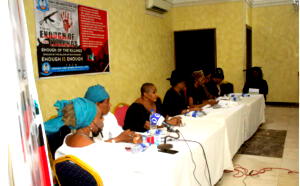APC By Tonnie Iredia Nigeria has enjoyed more than two decades of unbroken democratic government since 1999 when democracy was restored...


By Tonnie Iredia
Nigeria has enjoyed more than two decades of unbroken democratic government since 1999 when democracy was restored in the country. Thus, one would have thought we have had enough time to stabilize our political system, but this has not been so, because political parties which produce governments at state and federal levels have continued to exhibit incessant instability.
The main factor responsible for this was diagnosed long ago by former President, Ibrahim Babangida (IBB) as lack of interest by our political class in the running of political parties. What IBB found our politicians to greatly relish at that time, was the running of government; no one really wanted party office, making it hard for our political parties to be well managed. The situation is yet to change as our politicians are still heating up the polity through defections from one party to the other in search of government offices.
The average Nigerian political party has little or no viable structures just as there is no established and sustained process for running it. Yet, being an entity, which consists of people who have a common goal and is linked to an external environment, a political party possesses all the qualities of a formal organization which must be constantly managed to remain functioning.
The goals and resources of political parties may be different from those of other organizations; but like all organizations, their fortunes are attributable to the level of efficiency or otherwise in the planning and coordination of their activities. This can hardly be achieved in the absence of party officials with ample managerial expertise recruited solely for the purpose of planning, organizing and coordinating party activities.
Considering that virtually every member is out to use the party only as a channel for getting elected or appointed into public office, the subordination of individual interests to the overall goal of the organization is practically impossible. As a result, there is always process failure and lack of synergy among actors in the system.
More importantly, there is neither uniformity in operating procedures nor any form of unity of direction. Who does what, where, when and how are hardly systematized thereby creating room for cross-purpose actions as if how an entity is managed does not matter. This puts in abeyance any mechanism for preventing crisis or avoiding disintegration.
For Nigeria’s ruling All Progressives Congress (APC) it is not only conflicting individual interests that the party has to contend with, it also has disparate group interests arising from the failure to integrate into one viable entity, the component units which collaborated to form the party.
Three days ago, Governor Mai Mala Bunu of Yobe state, the party’s chair of the new caretaker and convention committee, set up to douse tension and crisis in the party wondered aloud that: if APC does not manage crisis, then crisis will manage the party.
We contend that if APC is well managed, she would probably have no business managing unending crisis because the routine challenges that would confront her are not likely to degenerate into a full blown crisis capable of diverting her attention from day to day smooth running to crisis management. Painfully, the party neither has officials with cognate management experience nor does she embrace manpower development for its officials. Same is true for other Nigerian political parties.
In 2018 for instance, the National Institute for Policy and Strategic Studies (NIPSS), Kuru, a foremost federal institution mandated to conceptualize and anchor the implementation of initiatives and strategies critical for national development, organized a series of seminars to strengthen capacities for managing political parties professionally.
This writer who was one of the resource persons can testify that attendance by managers of the big parties was poor. They shunned the scheme and sent junior officials who would have no opportunity to operationalize strategies discussed at the sessions. Little wonder, activities of such parties are never appropriately coordinated; instead, poor organizational approaches, lack of commitment to fairness in the handling of men and materials, impunity and high handedness are clearly discernible.
READ ALSO: Read Bola Tinubu’s text on APC crisis
The other day, the APC put together a team tutored to work from answer to question to disqualify the sitting governor of Edo State from participating in the governorship primaries to pick a flag bearer for the office he occupies.
Poor leadership is another major concern. Our politicians do not seem to fully comprehend the nature and full meaning of leadership. They think a leader can do and do and that there is indeed, only one leader. In truth, however, leadership does not refer to only occupants of the highest offices; there are leaders everywhere – ward leaders as well as women and youth leaders etc. and each of them is important.
Besides, leadership is a dependent variable as bad followers can ruin a good leader. Therefore, organizations are enjoined to follow the perspective of Warren Bennis, the legendary leadership theorist who says a leader is a person who has vision, passion and integrity. In other words, anyone without any of the three virtues is not a leader even though he is at the apex of organizational hierarchy.
As our courts have confirmed, a village ward leader can suspend the membership of a person which can as a result lead to the loss of his national chairmanship position.
All party organs should therefore be allowed to flourish so that the party would end up as a strong institution instead of having strong men. At the very top, good leadership can be attained by examining among other things personality traits and each person’s area of strength. A belligerent personality who can resort to physical combat should not be picked as a party’s national chair.
The possession of a more moderate trait would certainly be better so that staff do not have to always stop their boss from fighting instead of the other way round. A party may also have a problem if its top most leadership is needlessly garrulous which may lead to double-talking.
For example, a few years back, the APC chair said everything would be done to stop enigmatic Governor Samuel Ortom of Benue State from decamping from the party. But when the governor decamped barely two days later, the same chair described the governor as a comedian. Many other examples of self-denial abound.
As for party supremacy, Nigeria politicians should note that it does not confer unbridled power. Party supremacy presupposes that the party would be fair and just and that it would not deliberately injure any member or abort his fundamental rights. The injunction that members should exhaust party internal machinery for ventilating grievances before resorting to judicial help no doubt makes sense when there are issues between two members, but not so when it is a member versus a dictatorial leader who positions himself as his party’s supreme court.
In addition, political parties are public sector organizations which cannot abrogate the inherent powers of courts to supervise them. Consequently, party rules which outlaw judicial settlement of disputes would be untenable. APC and other parties have to avoid many flaws listed above if their officials are desirous of building viable political parties.
The post APC urgently requires experienced party managers appeared first on Vanguard News.

No comments